#anarchy faq
Text

A.2.16 Does anarchism require “perfect” people to work?
No. Anarchy is not a utopia, a “perfect” society. It will be a human society, with all the problems, hopes, and fears associated with human beings. Anarchists do not think that human beings need to be “perfect” for anarchy to work. They only need to be free. Thus Christie and Meltzer:
”[A] common fallacy [is] that revolutionary socialism [i.e. anarchism] is an ‘idealisation’ of the workers and [so] the mere recital of their present faults is a refutation of the class struggle … it seems morally unreasonable that a free society … could exist without moral or ethical perfection. But so far as the overthrow of [existing] society is concerned, we may ignore the fact of people’s shortcomings and prejudices, so long as they do not become institutionalised. One may view without concern the fact … that the workers might achieve control of their places of work long before they had acquired the social graces of the ‘intellectual’ or shed all the prejudices of the present society from family discipline to xenophobia. What does it matter, so long as they can run industry without masters? Prejudices wither in freedom and only flourish while the social climate is favourable to them … What we say is … that once life can continue without imposed authority from above, and imposed authority cannot survive the withdrawal of labour from its service, the prejudices of authoritarianism will disappear. There is no cure for them other than the free process of education.” [The Floodgates of Anarchy, pp. 36–7]
Obviously, though, we think that a free society will produce people who are more in tune with both their own and others individuality and needs, thus reducing individual conflict. Remaining disputes would be solved by reasonable methods, for example, the use of juries, mutual third parties, or community and workplace assemblies (see section I.5.8 for a discussion of how could be done for anti-social activities as well as disputes).
Like the “anarchism-is-against-human-nature” argument (see section A.2.15), opponents of anarchism usually assume “perfect” people — people who are not corrupted by power when placed in positions of authority, people who are strangely unaffected by the distorting effects of hierarchy, privilege, and so forth. However, anarchists make no such claims about human perfection. We simply recognise that vesting power in the hands of one person or an elite is never a good idea, as people are not perfect.
It should be noted that the idea that anarchism requires a “new” (perfect) man or woman is often raised by the opponents of anarchism to discredit it (and, usually, to justify the retention of hierarchical authority, particularly capitalist relations of production). After all, people are not perfect and are unlikely ever to be. As such, they pounce on every example of a government falling and the resulting chaos to dismiss anarchism as unrealistic. The media loves to proclaim a country to be falling into “anarchy” whenever there is a disruption in “law and order” and looting takes place.
Anarchists are not impressed by this argument. A moment’s reflection shows why, for the detractors make the basic mistake of assuming an anarchist society without anarchists! (A variation of such claims is raised by the right-wing “anarcho”-capitalists to discredit real anarchism. However, their “objection” discredits their own claim to be anarchists for they implicitly assume an anarchist society without anarchists!). Needless to say, an “anarchy” made up of people who still saw the need for authority, property and statism would soon become authoritarian (i.e. non-anarchist) again. This is because even if the government disappeared tomorrow, the same system would soon grow up again, because “the strength of the government rests not with itself, but with the people. A great tyrant may be a fool, and not a superman. His strength lies not in himself, but in the superstition of the people who think that it is right to obey him. So long as that superstition exists it is useless for some liberator to cut off the head of tyranny; the people will create another, for they have grown accustomed to rely on something outside themselves.” [George Barrett, Objections to Anarchism, p. 355]
Hence Alexander Berkman:
“Our social institutions are founded on certain ideas; as long as the latter are generally believed, the institutions built on them are safe. Government remains strong because people think political authority and legal compulsion necessary. Capitalism will continue as long as such an economic system is considered adequate and just. The weakening of the ideas which support the evil and oppressive present day conditions means the ultimate breakdown of government and capitalism.” [What is Anarchism?, p. xii]
In other words, anarchy needs anarchists in order to be created and survive. But these anarchists need not be perfect, just people who have freed themselves, by their own efforts, of the superstition that command-and-obedience relations and capitalist property rights are necessary. The implicit assumption in the idea that anarchy needs “perfect” people is that freedom will be given, not taken; hence the obvious conclusion follows that an anarchy requiring “perfect” people will fail. But this argument ignores the need for self-activity and self-liberation in order to create a free society. For anarchists, “history is nothing but a struggle between the rulers and the ruled, the oppressors and the oppressed.” [Peter Kropotkin, Act for Yourselves, p. 85] Ideas change through struggle and, consequently, in the struggle against oppression and exploitation, we not only change the world, we change ourselves at the same time. So it is the struggle for freedom which creates people capable of taking the responsibility for their own lives, communities and planet. People capable of living as equals in a free society, so making anarchy possible.
As such, the chaos which often results when a government disappears is not anarchy nor, in fact, a case against anarchism. It simple means that the necessary preconditions for creating an anarchist society do not exist. Anarchy would be the product of collective struggle at the heart of society, not the product of external shocks. Nor, we should note, do anarchists think that such a society will appear “overnight.” Rather, we see the creation of an anarchist system as a process, not an event. The ins-and-outs of how it would function will evolve over time in the light of experience and objective circumstances, not appear in a perfect form immediately (see section H.2.5 for a discussion of Marxist claims otherwise).
Therefore, anarchists do not conclude that “perfect” people are necessary anarchism to work because the anarchist is “no liberator with a divine mission to free humanity, but he is a part of that humanity struggling onwards towards liberty.” As such, ”[i]f, then, by some external means an Anarchist Revolution could be, so to speak, supplied ready-made and thrust upon the people, it is true that they would reject it and rebuild the old society. If, on the other hand, the people develop their ideas of freedom, and they themselves get rid of the last stronghold of tyranny — the government — then indeed the revolution will be permanently accomplished.” [George Barrett, Op. Cit., p. 355]
This is not to suggest that an anarchist society must wait until everyone is an anarchist. Far from it. It is highly unlikely, for example, that the rich and powerful will suddenly see the errors of their ways and voluntarily renounce their privileges. Faced with a large and growing anarchist movement, the ruling elite has always used repression to defend its position in society. The use of fascism in Spain (see section A.5.6) and Italy (see section A.5.5) show the depths the capitalist class can sink to. Anarchism will be created in the face of opposition by the ruling minorities and, consequently, will need to defend itself against attempts to recreate authority (see section H.2.1 for a refutation of Marxist claims anarchists reject the need to defend an anarchist society against counter-revolution).
Instead anarchists argue that we should focus our activity on convincing those subject to oppression and exploitation that they have the power to resist both and, ultimately, can end both by destroying the social institutions that cause them. As Malatesta argued, “we need the support of the masses to build a force of sufficient strength to achieve our specific task of radical change in the social organism by the direct action of the masses, we must get closer to them, accept them as they are, and from within their ranks seek to ‘push’ them forward as much as possible.” [Errico Malatesta: His Life and Ideas, pp. 155–6] This would create the conditions that make possible a rapid evolution towards anarchism as what was initially accepted by a minority “but increasingly finding popular expression, will make its way among the mass of the people” and “the minority will become the People, the great mass, and that mass rising up against property and the State, will march forward towards anarchist communism.” [Kropotkin, Words of a Rebel, p. 75] Hence the importance anarchists attach to spreading our ideas and arguing the case for anarchism. This creates conscious anarchists from those questioning the injustices of capitalism and the state.
This process is helped by the nature of hierarchical society and the resistance it naturally developed in those subject to it. Anarchist ideas develop spontaneously through struggle. As we discuss in section I.2.3, anarchistic organisations are often created as part of the resistance against oppression and exploitation which marks every hierarchical system and can., potentially, be the framework of a few society. As such, the creation of libertarian institutions is, therefore, always a possibility in any situation. A peoples’ experiences may push them towards anarchist conclusions, namely the awareness that the state exists to protect the wealthy and powerful few and to disempower the many. That while it is needed to maintain class and hierarchical society, it is not needed to organise society nor can it do so in a just and fair way for all. This is possible. However, without a conscious anarchist presence any libertarian tendencies are likely to be used, abused and finally destroyed by parties or religious groups seeking political power over the masses (the Russian Revolution is the most famous example of this process). It is for that reason anarchists organise to influence the struggle and spread our ideas (see section J.3 for details). For it is the case that only when anarchist ideas “acquire a predominating influence” and are “accepted by a sufficiently large section of the population” will we “have achieved anarchy, or taken a step towards anarchy.” For anarchy “cannot be imposed against the wishes of the people.” [Malatesta, Op. Cit., p. 159 and p. 163]
So, to conclude, the creation of an anarchist society is not dependent on people being perfect but it is dependent on a large majority being anarchists and wanting to reorganise society in a libertarian manner. This will not eliminate conflict between individuals nor create a fully formed anarchist humanity overnight but it will lay the ground for the gradual elimination of whatever prejudices and anti-social behaviour that remain after the struggle to change society has revolutionised those doing it.
#faq#anarchy faq#revolution#anarchism#daily posts#communism#anti capitalist#anti capitalism#late stage capitalism#organization#grassroots#grass roots#anarchists#libraries#leftism#social issues#economy#economics#climate change#climate crisis#climate#ecology#anarchy works#environmentalism#environment#solarpunk#anti colonialism#mutual aid#cops#police
31 notes
·
View notes
Text
im always surprised when i realize not everyone knows these exist! all your anarchist questions answered in one place! and i mean like ALL, esp that second link
—
🚨 want more materials like these? this resource was shared through BFP’s discord server! everyday, dozens of links and files are requested and offered by youth around the world! and every sunday, these youth get together for virtual teach-ins. if you’re interested in learning more, join us! link in our bio! 🚨
#resources#anarchism#anarchy#anarchist#faq#anti capitalism#abolition#history#property#education#environment
34 notes
·
View notes
Text
FANTASY HIGH JUNIOR YEAR TRAILER CHARACTER ART BREAKDOWN
The character artist credited for this season on the FAQ is Cait May! Without further ado, let's get into it.
Each character card has the PC art, the PC's name, the player's name, and a couple extra details such as an NPC they're connected to and/or plot points from the previous seasons.
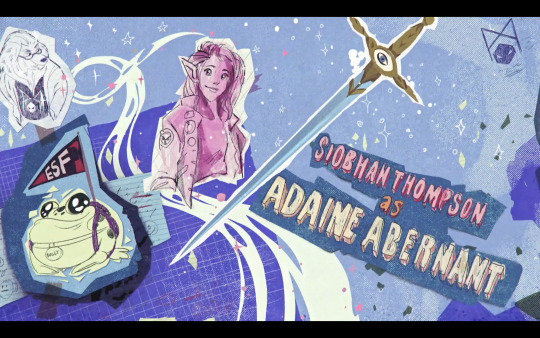
Here is Adaine's character card! Boggy gets pride of place of course, with his backpack and ESF (Emotional Support Frog) flag. The sword is possibly a step towards confirming the popular prediction that Adaine will multiclass as a Fighter this season. There's also a small sketch of Jawbone in the corner. Adaine's jacket has an owlbears patch on the sleeve!
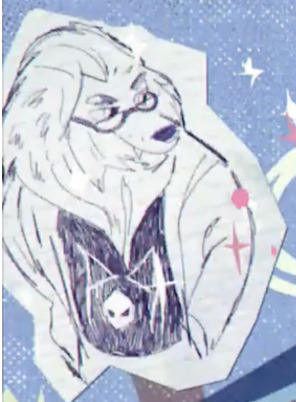


Fabian's character card follows a similar formula. There's a small sketch of Bill Seacaster in the upper left corner (titled PA-PA), and there are many references to dancing. Fabian holds his sheet. In several places the words Toxic Masculinity have been crossed out! He dances now! One of Fabian's first defining lines is referenced: "I'm here to be great!"
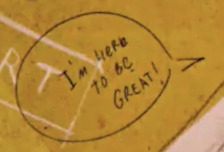
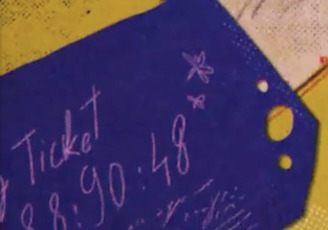
It's not very clear what this ticket is for, but to me it looks like a ticket to a dance recital!
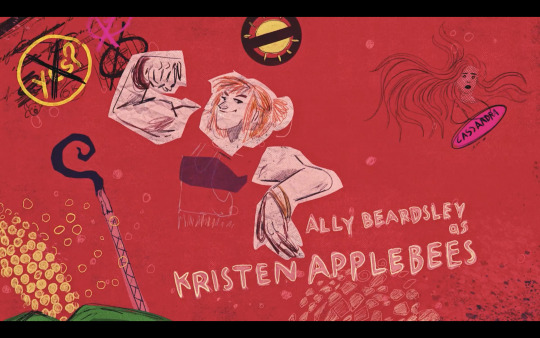
Kristen's character card is next! The many holy symbols she has previously believed in are seen, a sun has been crossed out, as well as "yes?". Cassandra appears in the upper right corner, while an ear of corn appears in the lower left, not crossed out!

Cassandra looks vaguely worried, which could be their natural state, or it could indicate that Kristen's questions of faith are still just as present as they have been previously.
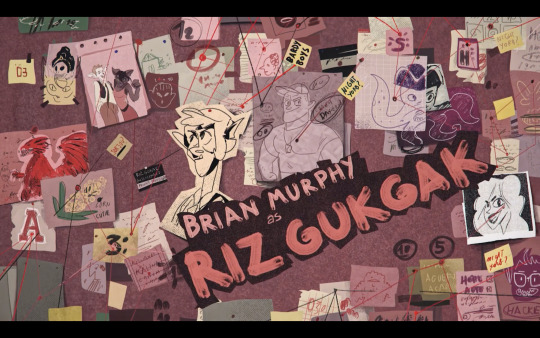
Riz's character card is a lot more detailed than the previous ones. Trailer analysts far more intense than I will have a field day with this, I'm gonna give the sparknotes. Riz takes front and center, with his (un)license above his shoulder! Next to him is a sketch of Coach Daybreak. Several sticky notes with the words Night Yorb appear, as well as references Riz's previous cases. Drawings of Kalvaxus and a Corn Cutie are next to each other. The photo of Pok and Kalina is shown, as is a drawing of Baron. There's also a sticky note with "Jorjug" on it, which probably isn't as important but I certainly enjoy it.
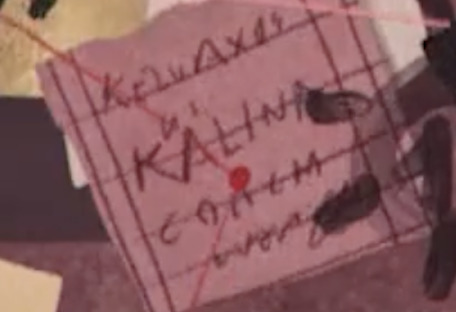
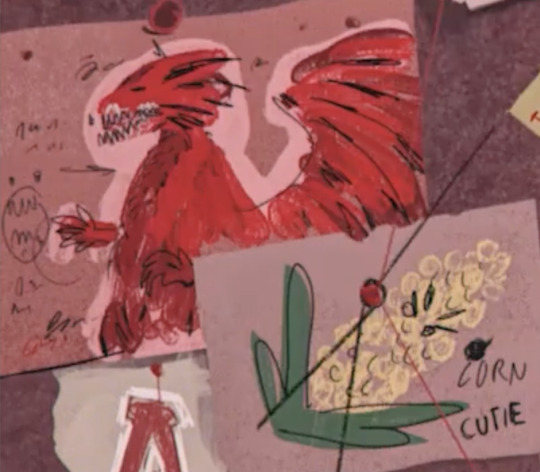
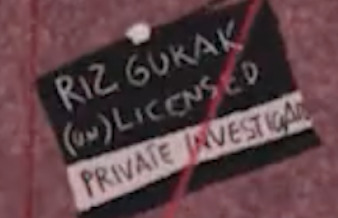
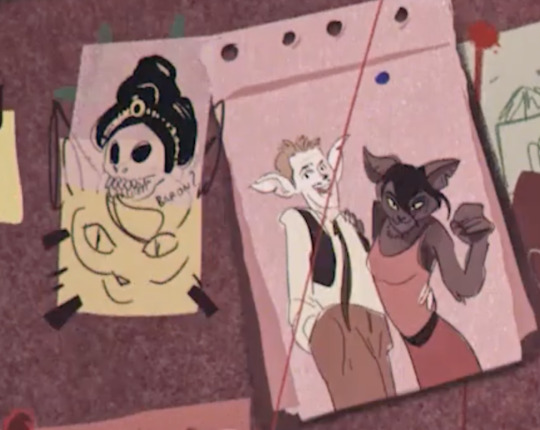

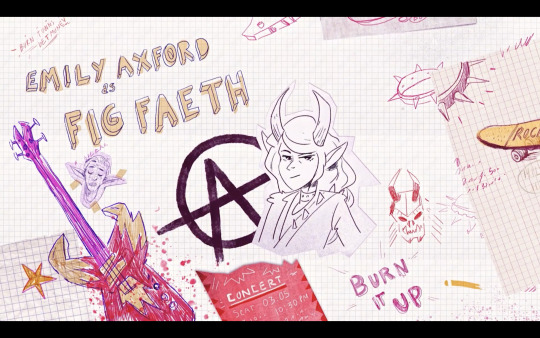
Fig's character card features her art for the season, a large Anarchy symbol, and her bass guitar. A small sketch of Gilear is shown, as well as a ticket to what's likely a Cig Figs concert, and a skateboard!
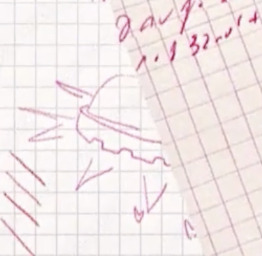
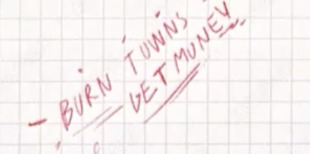
The toe of a combat boot is poking out from behind the paper with the skateboard on it. Burn Towns, Get Money is also written in the corner, which is the name of one of Fig and the Cig Figs' hit songs. The Sig Figs Collective put out a fan song version that slaps, which you can find here! (Tbh you should just check out their whole discography)
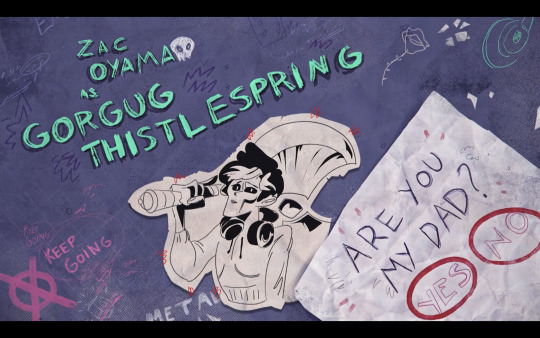
Gorgug and his greatest hits appear on this character card! The 'are you my dad' bit keeps on running. Keep Going is also written several times. The white streaks are still in his hair, headphones around his neck, and his axe gets the most movement we've seen in one of these cards.

(Gorgug gets a small animation in the transition to his character card!)
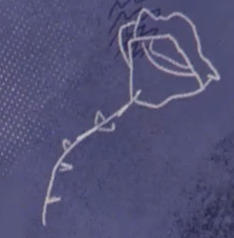
The word metal is shown, as well as a sketch of the metal flower from the very first episode.
There are also a couple of group shots!

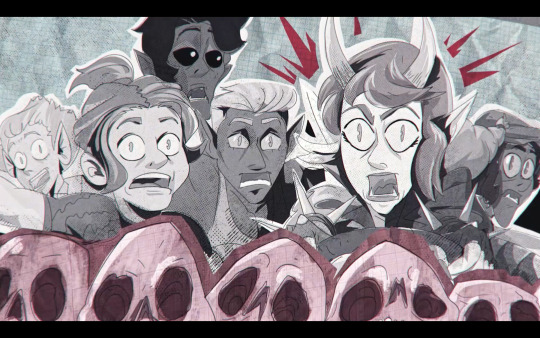
Look at them go! The Bad Kids are back and I am so excited to see where they go this year.
#long post#breakdowns#fantasy high#fantasy high junior year#art#dropout art team <3#adaine#Fabian#kristen applebees#riz#fig!#gorgug#dropout tv#dimension 20#verbal component
534 notes
·
View notes
Note
recomendations of fundamental revolutionary literature? please
it kinda depends on what you're looking for specifically.
if you're simply looking for fundamental introductory texts to anarchism from the perspective of a beginner who wants to learn more about the subject:
Emma Goldman, Anarchism & Other Essays
Errico Malatesta, An Anarchist Programme
Errico Malatesta, Anarchy
Peter Gelderloos, Anarchy Works
Alexander Berkman, What is Communist Anarchism?
Strangers In a Tangled Wilderness, Life Without Law: An introduction to anarchist politics
Marquis Bey, Anarcho-Blackness
Indigenous Action, Voting is Not Harm Reduction
if you're looking for more texts surrounding revolution itself, revolutionary thought and history
Peter Marshall, Demanding the Impossible: A History of Anarchism
George Orwell, Homage to Catalonia
Bonanno, From Riot to Insurrection
LibCom has a reading guide on the Spanish Civil War
i would also check out the Librarian Picks and the Anarchist FAQ at the Anarchist Library.
for video, Zoe Baker is a good resource on YouTube
hope this is helpful
253 notes
·
View notes
Text
hello and welcome to…
THE DAD BRACKET
the bracket where YOU, the tumblr dot com masses, get to decide your FAVORITE DAD.
Da Rulez 📖
FICTIONAL DADS ONLY!!! don’t be weird.
cis men, trans men, and masc nb folks all qualify as a dad! i’m all for gender anarchy, but i need to bottleneck the number of submissions somehow. (i’m a brainweird senior in college i am busy and my brain is very fickle. you know how it is)
no bad dads please!!! i don’t wanna see any canonically shitty dudes on this list.
before submitting, click HERE to see who’s been submitted already. i’ll be including as many as i can, with an even number; who gets in won’t be based on number of submissions because i want to keep the size of the spreadsheet manageable. also, feel free to check the FAQ!
shoutout to @battle-of-the-dads and @single-father-swag-competition for being fellow Dad Tournaments. inspirations under the cut!
SUBMIT YOUR DADS HERE, and may the best dad win!!!!
the inspirations:
@ultimate-fnaf-showdown @ut-side-character-showdown @ultimate-rat-bracket @neurodivergentswagsummit @malewife-swag-competition @swaglesscompetition @soppingwetbeastoff @foundfamilyarena @plural-swag-competition @ultimatefnaf-favoritecompetition @best-fnaf-character @girlbosswar @bestcharacterwithfirepowers @rabbitswag-competition @redandgreenpoll @fuckablerobotbracket (run by one of my besties) @creature-competition @letsgetreadytotumble @nonbiney-swag-competition @character-of-all-time @pinknredbracket @bestfnafcharacter
165 notes
·
View notes
Note
Hi!
I am a Marxist-Leninist, but lately I have been thinking about getting closer to anarchists. First and foremost because my local communist organisation behaved absolutely inhumane lately (anarchists are also not perfect but not that bad, or at least they seem so), but I also admit that anarchist criticism of ML asks questions that I also wonder about.
So like, can you share some readings on anarchist theory and practice for someone with ML background?
If you have enough spoons to waste on me, here is what made me associate with ML:
(Break is weird because I do it to separate main part from addition)
Mostly just the fact that out of people around me they were making the most sense when discussing current affairs and history, but also like most of the available alternatives range from liberals who literally admire Hobbes as great hero to open fascist (both Hitler and Mussolini types, I live in such a diverse society), so it's not hard. Also like the only revolutions that lasted more than a couple of years were ML in nature, but also all of those states while achieving things eventually decayed and gave birth to elites of their own, so like, there is something wrong with the scheme. Also as I said I care a lot about history as a foundation of my beliefs, and Marxists make the most sense out of it, but also even more advanced versions than Engels have plenty of what I assume to be blind spots. It's mostly some distant stuff like how feudalism is in no way successor to Ancient world and not as universal as it "should" be, but any failure to explain something in the past makes someone's prediction of future questionable.
I can recommend a few introductory books, though they are not by all means the be all-end all of anarchist thought. Anarchism is a widely spread ideology, and especially at its intersection of socialism, and opinions differ from theorist to theorist, even if basic principles are mostly agreed upon. Keep that in mind as you explore further.
Anarchy Works by Peter Gelderloos is probably the most popular introductory work, and explains the basic principles quite nicely, although in my opinion it does contain some inaccuracies, policies I don't support and glosses over some points which should be explored more.
An Anarchist FAQ is not so much a coherent theoretical work, but is rather an exploration and rebuttal of frequently asked questions from a social anarchist perspective. It's by no means perfect, and does not claim to be so. Personally, it's a little mutualistic for my tastes, but there's good stuff in there.
Anarchy by Errico Malatesta is far closer to a classic piece of theory, if a short one, expressing the positions of a committed Anarcho Communist and one of the most prominent theorists of modern Anarchism. Although Malatesta is against syndicalism more than I would be, it's still a great introductory work.
Anarchism and Other Essays by Emma Goldman is seen as a pivotal work by many in explaining the philosophy of anarchism, as well as offering a contemporary view of anarchist theory at the previous apex of the movement at the turn of the 20th century.
As for history, many social anarchist at least largely agree with the Social view of history Marx postulated in broad terms, though there is heavy debate and disagreement on the finer points. Digressing from that, Kropotkin's Mutual Aid: A Factor of Evolution is probably the widest distributed work of the intersection of anthropology, history, and anarchism, even if it uses outdated terms and phrases. Debt: The First 5000 Years by David Graeber and Against The Grain by James C Scott both explore the early history of states, with the former going more into economic value theories and the latter going more into the history and causes of the state itself. Scott's other works critiquing the state (Seeing Like a State and Two Cheers for Anarchism) are also quite good, which is impressive considering he does not call himself an anarchist.
If you'd like to discuss one on one, you can message me here or on my discord, I'll be happy to discuss. Happy reading, friend.
17 notes
·
View notes
Text
Some introductory reading (ordered by aescending complexity) to learn about Marxism and Anarchism
-Marxism-
The Principles of Communism by Frederick Engels (1847) - essentially an early FAQ on communist theory
Value, Price and Profit and Wage Labour and Capital by Karl Marx (1847) - short pamphlets written for the average worker that discuss the structure of capitalism and its effects on all classes
The Three Sources and Three Component Parts of Marxism by Vladimir Lenin (1913) - The different facets of Marxism and why they're important (philosophy, economy, and politics)
The Motorcycle Diaries by Che Guevara (1992) - the story of Che Guevara before he became a Marxist revolutionary; link is an incomplete transcript, full book can be found elsewhere
Imperialism, the Highest Stage of Capitalism by Vladimir Lenin (1917) - a 92 page pamphlet discussing how capitalism always progresses to imperialism
Das Kapital: Chapter One by Karl Marx (1867) - the first chapter of the first volume of Marx's Capital, which proposes several critiques of capitalism
-Anarchism-
To Change Everything: an anarchist appeal by CrimethInc. - an appeal and introduction to basic anarchist thought
Are You An Anarchist? The Answer May Surprise You! by David Graeber (2000) - an introduction to anarchism using simple everyday situations
Anarchy 101 by "dot matrix" (2012) - an FAQ for Anarchist beliefs
An Anarchist FAQ: Section A - What is Anarchism? by "Anarcho" (1996-2023) - another FAQ that's much older but still being updated
Listen, Marxist!, an excerpt from Post-Scarcity Anarchism by Murray Bookchin (1986) - a chapter criticizing Marxist theory from the perspective of an anarchist
Anarchy Works by Peter Gelderloos (2010) - answers common objections towards anarchism with real-world historical examples of anarchist societies
9 notes
·
View notes
Text
Meet Me!!

Hello! You can call me Floppy, Skeley or Mag (there’s the first three letters of my name folks!), whichever is fine! I am currently obsessed with anything fnaf (specifically dca!) or cotl, and like to draw!
no I haven’t redone this mta post seven times now wdym
AU MASTERPOST!! [coming soon!]
-No Good AU (tsams au)
-Solar Judgement AU (god au)
-Kill the Lights AU (movie/acting au)
-Baby au (I don’t have a name for it yet) not a fic
-Copy Eclipse au (tsams au) not a fic
-Masterpost
FAQ
Tags (that I use frequently):
#floppy art or #floppy doodles
#floppy answers something
#floppy says something
[about me]
Goofy lil drawing meme I did just so you can know me better:

My Bluesky
Favorite things:
Foods:
-Gummy Worms
-Cheddar Bay Biscuits from Red Lobster
-Watermelon
-Lemons
Games:
-Stardew Valley
-Fnaf
-Deltarune
Songs:
-anarchy by Egg
-Take on Me by a-ha
-Smile by Ukuletea
-Ferryman by Shayfer James
Song Artists:
-Shayfer James
-Will Wood (and Will Wood and the Tapeworms)
-Egg
Shows/Movies (youtube too):
-Seinfeld
-Lackadaisy
-Hazbin Hotel
-fnaf Movie :)
-Tommy Boy
-Robin Hood Men in Tights
Actors:
-David Spade
-Will Ferrell
-Chris Farley
-Adam Sandler
wanna know any of my other favorite things? Ask me about it, i don’t mind!
#meet the artist#mta 2023#meet me#my persona#my sona#aromantic#this post will probably get edited throughout time
13 notes
·
View notes
Text

I posted 2,997 times in 2022
That's 641 more posts than 2021!
1,250 posts created (42%)
1,747 posts reblogged (58%)
Blogs I reblogged the most:
@anarchy-and-piglins
@radios-arcade
@areus-in-a-little-cave
@bansq
@tinyheinz
I tagged 2,966 of my posts in 2022
Only 1% of my posts had no tags
#technoblade - 1,320 posts
#fanart - 1,309 posts
#asks - 660 posts
#thoughts - 482 posts
#philza - 333 posts
#wilbur soot - 165 posts
#ranboo - 156 posts
#tommyinnit - 152 posts
#shara writes - 116 posts
#fav - 104 posts
Longest Tag: 140 characters
#like what would i even do with that much money if i can afford a roof above my head and the occasional fancy starbucks coffee drink i'm good
My Top Posts in 2022:
#5

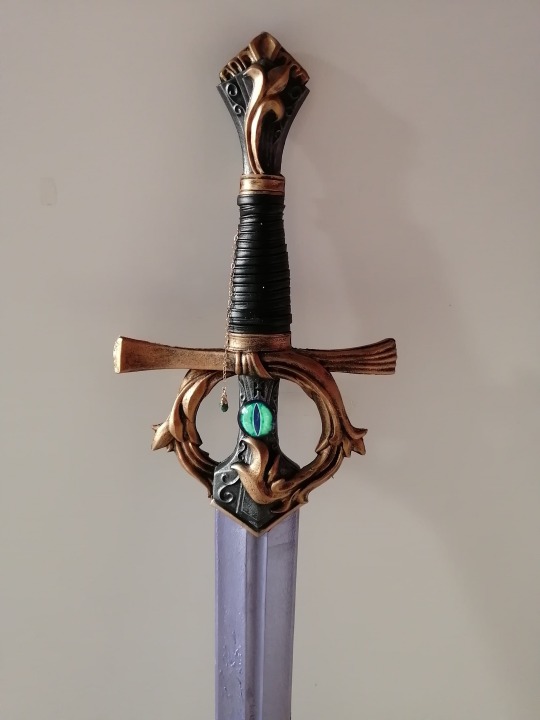
See the full post
2,192 notes - Posted October 18, 2022
#4

HELP THIS MAN IS SO BASED????
2,533 notes - Posted January 9, 2022
#3
tumblr_video
I didn’t see anybody post this clip from Badboyhalo’s stream last night yet and that’s a crime because Bad calling Techno a “lil ham sandwich” is the best thing ever I’m crying /pos
2,559 notes - Posted January 27, 2022
#2

Technodad changed the Reddit FAQ (he will probably change it again though because he's not sure if it's too dark)
3,079 notes - Posted October 25, 2022
My #1 post of 2022
Technoblade leaves the Dream SMP server in the middle of the night.
He doesn’t take anything with him. No armor, no weapons, nothing. He doesn’t even take his dogs or Steve. Only Carl, the stable emptied by the first signs of dawn.
Instead, he leaves notes.
One for Ranboo, one for Niki. One for Wilbur, one for Tommy.
He leaves one for Phil too, slightly different than the rest. There’s another line at the bottom, a set of coordinates.
(“To the gates of hell,” Phil had said.
“What about just anywhere but here?” Techno had answered.)
There’s another server. A smaller one, with more sunshine and mob-proofed fences. Where Techno does not ever have to pick up a weapon. Where Techno does not have to continue fighting.
Where there is no need for him to do anything but tend to his farms and sit outside to read, feed Carl carrots and nap as much as he wants. Where the distant crackle of a portal won’t mean anything except the welcomed visit of an old friend.
Where he can rest easy.
Because the war is over.
And dust settles on pain. And regrets become worn with age. And memories will bring strength more than they will sting.
(Perhaps, they will visit. Perhaps, Phil will come along one day and bring with him the people Techno loved and who loved Techno and who Techno hurt and who hurt Techno.
Perhaps they will find something worth holding onto in the ruins dug between them, that will grow flowers again.)
And on this new server, Technoblade is happy.
(And the universe said, you are not alone.)
And on this new server, Technoblade knows peace.
(And the universe said I love you because you are love.)
5,301 notes - Posted July 2, 2022
Get your Tumblr 2022 Year in Review →
25 notes
·
View notes
Text

A.2.15 What about “human nature”?
Anarchists, far from ignoring “human nature,” have the only political theory that gives this concept deep thought and reflection. Too often, “human nature” is flung up as the last line of defence in an argument against anarchism, because it is thought to be beyond reply. This is not the case, however. First of all, human nature is a complex thing. If, by human nature, it is meant “what humans do,” it is obvious that human nature is contradictory — love and hate, compassion and heartlessness, peace and violence, and so on, have all been expressed by people and so are all products of “human nature.” Of course, what is considered “human nature” can change with changing social circumstances. For example, slavery was considered part of “human nature” and “normal” for thousands of years. Homosexuality was considered perfectly normal by the ancient Greeks yet thousands of years later the Christian church denounced it as unnatural. War only become part of “human nature” once states developed. Hence Chomsky:
“Individuals are certainly capable of evil … But individuals are capable of all sorts of things. Human nature has lots of ways of realising itself, humans have lots of capacities and options. Which ones reveal themselves depends to a large extent on the institutional structures. If we had institutions which permitted pathological killers free rein, they’d be running the place. The only way to survive would be to let those elements of your nature manifest themselves.
“If we have institutions which make greed the sole property of human beings and encourage pure greed at the expense of other human emotions and commitments, we’re going to have a society based on greed, with all that follows. A different society might be organised in such a way that human feelings and emotions of other sorts, say, solidarity, support, sympathy become dominant. Then you’ll have different aspects of human nature and personality revealing themselves.” [Chronicles of Dissent, pp. 158]
Therefore, environment plays an important part in defining what “human nature” is, how it develops and what aspects of it are expressed. Indeed, one of the greatest myths about anarchism is the idea that we think human nature is inherently good (rather, we think it is inherently sociable). How it develops and expresses itself is dependent on the kind of society we live in and create. A hierarchical society will shape people in certain (negative) ways and produce a “human nature” radically different from a libertarian one. So “when we hear men [and women] saying that Anarchists imagine men [and women] much better than they really are, we merely wonder how intelligent people can repeat that nonsense. Do we not say continually that the only means of rendering men [and women] less rapacious and egotistic, less ambitious and less slavish at the same time, is to eliminate those conditions which favour the growth of egotism and rapacity, of slavishness and ambition?” [Peter Kropotkin, Act for Yourselves, p. 83]
As such, the use of “human nature” as an argument against anarchism is simply superficial and, ultimately, an evasion. It is an excuse not to think. “Every fool,” as Emma Goldman put it, “from king to policemen, from the flatheaded parson to the visionless dabbler in science, presumes to speak authoritatively of human nature. The greater the mental charlatan, the more definite his insistence on the wickedness and weakness of human nature. Yet how can any one speak of it to-day, with every soul in prison, with every heart fettered, wounded, and maimed?” Change society, create a better social environment and then we can judge what is a product of our natures and what is the product of an authoritarian system. For this reason, anarchism “stands for the liberation of the human mind from the dominion of religion; the liberation of the human body from the dominion of property; liberation from the shackles and restraint of government.” For ”[f]reedom, expansion, opportunity, and above all, peace and repose, alone can teach us the real dominant factors of human nature and all its wonderful possibilities.” [Red Emma Speaks, p. 73]
This does not mean that human beings are infinitely plastic, with each individual born a tabula rasa (blank slate) waiting to be formed by “society” (which in practice means those who run it). As Noam Chomsky argues, “I don’t think its possible to give a rational account of the concept of alienated labour on that assumption [that human nature is nothing but a historical product], nor is it possible to produce something like a moral justification for the commitment to some kind of social change, except on the basis of assumptions about human nature and how modifications in the structure of society will be better able to conform to some of the fundamental needs that are part of our essential nature.” [Language and Politics, p. 215] We do not wish to enter the debate about what human characteristics are and are not “innate.” All we will say is that human beings have an innate ability to think and learn — that much is obvious, we feel — and that humans are sociable creatures, needing the company of others to feel complete and to prosper. Moreover, they have the ability to recognise and oppose injustice and oppression (Bakunin rightly considered ”the power to think and the desire to rebel” as “precious faculties.” [God and the State, p. 9]).
These three features, we think, suggest the viability of an anarchist society. The innate ability to think for oneself automatically makes all forms of hierarchy illegitimate, and our need for social relationships implies that we can organise without the state. The deep unhappiness and alienation afflicting modern society reveals that the centralisation and authoritarianism of capitalism and the state are denying some innate needs within us. In fact, as mentioned earlier, for the great majority of its existence the human race has lived in anarchic communities, with little or no hierarchy. That modern society calls such people “savages” or “primitive” is pure arrogance. So who can tell whether anarchism is against “human nature”? Anarchists have accumulated much evidence to suggest that it may not be.
As for the charge the anarchists demand too much of “human nature,” it is often non anarchists who make the greatest claims on it. For “while our opponents seem to admit there is a kind of salt of the earth — the rulers, the employers, the leaders — who, happily enough, prevent those bad men — the ruled, the exploited, the led — from becoming still worse than they are” we anarchists “maintain that both rulers and ruled are spoiled by authority” and ”both exploiters and exploited are spoiled by exploitation.” So “there is [a] difference, and a very important one. We admit the imperfections of human nature, but we make no exception for the rulers. They make it, although sometimes unconsciously, and because we make no such exception, they say that we are dreamers.” [Peter Kropotkin, Op. Cit., p. 83] If human nature is so bad, then giving some people power over others and hoping this will lead to justice and freedom is hopelessly utopian.
Moreover, as noted, Anarchists argue that hierarchical organisations bring out the worse in human nature. Both the oppressor and the oppressed are negatively affected by the authoritarian relationships so produced. “It is a characteristic of privilege and of every kind of privilege,” argued Bakunin, “to kill the mind and heart of man … That is a social law which admits no exceptions … It is the law of equality and humanity.” [God and the State, p. 31] And while the privileged become corrupted by power, the powerless (in general) become servile in heart and mind (luckily the human spirit is such that there will always be rebels no matter the oppression for where there is oppression, there is resistance and, consequently, hope). As such, it seems strange for anarchists to hear non-anarchists justify hierarchy in terms of the (distorted) “human nature” it produces.
Sadly, too many have done precisely this. It continues to this day. For example, with the rise of “sociobiology,” some claim (with very little real evidence) that capitalism is a product of our “nature,” which is determined by our genes. These claims are simply a new variation of the “human nature” argument and have, unsurprisingly, been leapt upon by the powers that be. Considering the dearth of evidence, their support for this “new” doctrine must be purely the result of its utility to those in power — i.e. the fact that it is useful to have an “objective” and “scientific” basis to rationalise inequalities in wealth and power (for a discussion of this process see Not in Our Genes: Biology, Ideology and Human Nature by Steven Rose, R.C. Lewontin and Leon J. Kamin).
This is not to say that it does not hold a grain of truth. As scientist Stephen Jay Gould notes, “the range of our potential behaviour is circumscribed by our biology” and if this is what sociobiology means “by genetic control, then we can scarcely disagree.” However, this is not what is meant. Rather, it is a form of “biological determinism” that sociobiology argues for. Saying that there are specific genes for specific human traits says little for while ”[v]iolence, sexism, and general nastiness are biological since they represent one subset of a possible range of behaviours” so are “peacefulness, equality, and kindness.” And so “we may see their influence increase if we can create social structures that permit them to flourish.” That this may be the case can be seen from the works of sociobiologists themselves, who “acknowledge diversity” in human cultures while “often dismiss[ing] the uncomfortable ‘exceptions��� as temporary and unimportant aberrations.” This is surprising, for if you believe that “repeated, often genocidal warfare has shaped our genetic destiny, the existence of nonaggressive peoples is embarrassing.” [Ever Since Darwin, p. 252, p. 257 and p. 254]
Like the social Darwinism that preceded it, sociobiology proceeds by first projecting the dominant ideas of current society onto nature (often unconsciously, so that scientists mistakenly consider the ideas in question as both “normal” and “natural”). Bookchin refers to this as “the subtle projection of historically conditioned human values” onto nature rather than “scientific objectivity.” Then the theories of nature produced in this manner are transferred back onto society and history, being used to “prove” that the principles of capitalism (hierarchy, authority, competition, etc.) are eternal laws, which are then appealed to as a justification for the status quo! “What this procedure does accomplish,” notes Bookchin, “is reinforce human social hierarchies by justifying the command of men and women as innate features of the ‘natural order.’ Human domination is thereby transcribed into the genetic code as biologically immutable.” [The Ecology of Freedom, p. 95 and p. 92] Amazingly, there are many supposedly intelligent people who take this sleight-of-hand seriously.
This can be seen when “hierarchies” in nature are used to explain, and so justify, hierarchies in human societies. Such analogies are misleading for they forget the institutional nature of human life. As Murray Bookchin notes in his critique of sociobiology, a “weak, enfeebled, unnerved, and sick ape is hardly likely to become an ‘alpha’ male, much less retain this highly ephemeral ‘status.’ By contrast, the most physically and mentally pathological human rulers have exercised authority with devastating effect in the course of history.” This “expresses a power of hierarchical institutions over persons that is completely reversed in so-called ‘animal hierarchies’ where the absence of institutions is precisely the only intelligible way of talking about ‘alpha males’ or ‘queen bees.’” [“Sociobiology or Social Ecology”, Which way for the Ecology Movement?, p. 58] Thus what makes human society unique is conveniently ignored and the real sources of power in society are hidden under a genetic screen.
The sort of apologetics associated with appeals to “human nature” (or sociobiology at its worse) are natural, of course, because every ruling class needs to justify their right to rule. Hence they support doctrines that defined the latter in ways appearing to justify elite power — be it sociobiology, divine right, original sin, etc. Obviously, such doctrines have always been wrong … until now, of course, as it is obvious our current society truly conforms to “human nature” and it has been scientifically proven by our current scientific priesthood!
The arrogance of this claim is truly amazing. History hasn’t stopped. One thousand years from now, society will be completely different from what it is presently or from what anyone has imagined. No government in place at the moment will still be around, and the current economic system will not exist. The only thing that may remain the same is that people will still be claiming that their new society is the “One True System” that completely conforms to human nature, even though all past systems did not.
Of course, it does not cross the minds of supporters of capitalism that people from different cultures may draw different conclusions from the same facts — conclusions that may be more valid. Nor does it occur to capitalist apologists that the theories of the “objective” scientists may be framed in the context of the dominant ideas of the society they live in. It comes as no surprise to anarchists, however, that scientists working in Tsarist Russia developed a theory of evolution based on cooperation within species, quite unlike their counterparts in capitalist Britain, who developed a theory based on competitive struggle within and between species. That the latter theory reflected the dominant political and economic theories of British society (notably competitive individualism) is pure coincidence, of course.
Kropotkin’s classic work Mutual Aid, for example, was written in response to the obvious inaccuracies that British representatives of Darwinism had projected onto nature and human life. Building upon the mainstream Russian criticism of the British Darwinism of the time, Kropotkin showed (with substantial empirical evidence) that “mutual aid” within a group or species played as important a role as “mutual struggle” between individuals within those groups or species (see Stephan Jay Gould’s essay “Kropotkin was no Crackpot” in his book Bully for Brontosaurus for details and an evaluation). It was, he stressed, a “factor” in evolution along with competition, a factor which, in most circumstances, was far more important to survival. Thus co-operation is just as “natural” as competition so proving that “human nature” was not a barrier to anarchism as co-operation between members of a species can be the best pathway to advantage individuals.
To conclude. Anarchists argue that anarchy is not against “human nature” for two main reasons. Firstly, what is considered as being “human nature” is shaped by the society we live in and the relationships we create. This means a hierarchical society will encourage certain personality traits to dominate while an anarchist one would encourage others. As such, anarchists “do not so much rely on the fact that human nature will change as they do upon the theory that the same nature will act differently under different circumstances.” Secondly, change “seems to be one of the fundamental laws of existence” so “who can say that man [sic!] has reached the limits of his possibilities.” [George Barrett, Objections to Anarchism, pp. 360–1 and p. 360]
For useful discussions on anarchist ideas on human nature, both of which refute the idea that anarchists think human beings are naturally good, see Peter Marshall’s “Human nature and anarchism” [David Goodway (ed.), For Anarchism: History, Theory and Practice, pp. 127–149] and David Hartley’s “Communitarian Anarchism and Human Nature”. [Anarchist Studies, vol. 3, no. 2, Autumn 1995, pp. 145–164]
#faq#anarchy faq#revolution#anarchism#daily posts#communism#anti capitalist#anti capitalism#late stage capitalism#organization#grassroots#grass roots#anarchists#libraries#leftism#social issues#economy#economics#climate change#climate crisis#climate#ecology#anarchy works#environmentalism#environment#solarpunk#anti colonialism#mutual aid#cops#police
25 notes
·
View notes
Text
Heya!!! My name is Steyci18, (aka Steyci Strawberry, or Steyci), you are probably here because you like my art ~(•ω• )~ Yey!!
Well a little bit about me
My birthday is on 18th of June, on less words... I'm a Gemini!
I speak a lot of languages, such as English, Japanese, Russian, Spanish, Germany and French
I actually have a boyfriend called Chrys, aka Goldy freddy. He and I did a lot of things together, like trying to hack an account, taking over the fandom, corrupting the FNaF fandom admins, making an anarchy... In short, typical of couples <3
I am Pansexual and Asexual, (kinda hard to explain)
FAQ:
Q: Why you never do digital art?
A: Two words, Parental Control, if I want to do art I have to do it in Notes, or in Gallery editor, and is really lazy.
Q: You have any pet?
A: Yes! I have two Sphynx cats, two hairless dogs, two birds, two hamsters and a turtle.
Q: What is exactly Black & White?
A: B&W is a FNaF AU where is protagonized by Lolbit, Springtrap and Ennard. Maybe one day I translate the book I did and I post it here.
Q: What you usually do when you aren't drawing?
A: Probably studying some history of England, I love England and British people! Or maybe I'm watching videos, taking care of my brothers, playing with my cats or reading/writing
Q: Where are you from?
A: Guess it 😌
Q: Asexual and Pansexual?
A: When I said that I was meaning in fact uhh, I don't like having sex or someone touching me, or kissing me, I can have a boyfriend, any type, I don't care, but without kisses or hugs or sex...
Q: No bitches?
A: No bitches 😞
You can found me too in:
Roblox as: steyci_roblox
YouTube as: Steyci_Strawberry:3
Fandom as: Steyci Strawberry
Pinterest as: Steyci Strawberry
DevianArt as: Steyci-Strawberry
Tik Tok as: _itz_lolbit_
Join to my Fandom!
13 notes
·
View notes
Text
Vulnerability
Last I checked you can buy a physical copy of the anarchist FAQ from AK Press but it’s separated into two volumes do to length. I appreciate the project, though it unintentionally demonstrated the seemingly sisyphean task we carry.
I think most friends and family probably know that I’m an anarchist even if I don’t exactly bring it up in regular conversation. Hints are dropped and word spreads fast. I both dread and look forward to the conversations where someone somewhat timidly brings up the topic of my absurd political position. I’ve won countless arguments in my head while pacing back and forth in my apartment but that never seems to stop me from being a nervous wreck when the topic actually comes up.
Where the state occupies an infinite space in it’s god like legitimacy anarchy is an empty space. Overwhelming in it’s negation, and uncomfortable in it’s nakedness.
“The state calls its own violence law, but that of the individual, crime.”
Perhaps the most basic statement of Stirner’s political philosophy. But what concern is hypocrisy to the nihilist? What recourse does Stirner have to condemn anyone? The Unique and Its Property is largely dedicated to defanging ethical concepts so what recourse does Stirner have when they don’t live up to his standards?
Stirner seems oblivious or indifferent to his own ethical subtext. His critics are quick to point out that Max seems to hold a strange position that we ought to be nihilists. The seeming glaring contradiction riddles his whole work.
For Stirner, philosophy has tended to fill a kind of backwards role. Reality, and in particular the self, are ultimately non-conceptual. Yet we seem to be obsessed with purity of concepts. We want them to fit like neat bathroom tiles. Stack them up like bricks and mortar. Stirner seems more inline with the Taoists, every concept, to the extent that we insist on its purity, its truth, is a kind of destruction. We sacrifice a non-conceptual reality for the sake of legibility.
Stirner isn’t satisfied with merely pointing out concepts will never live up to their own expectations, he seems to believe we shouldn’t hold them to that standard to begin with. That’s the whole trouble with Stirner’s work, he seems concerned about the ethical implications of ethics.
John Carrol in the amazingly under-read Escape From the Crystal Palace compares Dostoevsky’s Christianity, of all things, to Stirner’s hyper-nominalism and hints at its ethical implications through the story of The Grand Inquisitor. To quote at length:
”Stirner and Nietzsche imply that there is a type of freedom available to man in which ideology is not dominant, in which morality is adaptable to the needs of the individual; a state beyond good and evil. One counter-argument, which is stronger than they cater for, runs to the effect that this assumption is psychologically unfounded, that it is utopian in the repressive sense of serving to awaken unrealizable hopes. The case is put by the Grand Inquisitor in Dostoevsky’s The Brothers Karamazov. He argues against Christ, who represents a position identical to that of Stirner, that men do not want this freedom, that they do not seek to determine their own values. He impeaches Christ for having too little compassion for man, for failing to respect his choice, which will be for happiness, given that happiness and freedom are incompatible. The Inquisitor himself chooses to take on the responsibility of making decisions and determine values; he provides the happier majority with bread to eat and miracles to save them from boredom. He would grant the truth of Stirner’s ‘You love man therefore you torture the individual man’. His defense is that the will of the majority urges that Christ be killed. The Christ's response, to kiss the Grand Inquisitor, is bafflingly and assertively anarchic, in the characteristic sense that little more can be said about it than that it expresses the individual. It is irrational in that it rejects the terms of the debate…”
-John Carrol Escape from the Crystal Palace
Effortlessly Carrol see’s Christianity and nihilism occupying the same space if only for a brief moment. In the moment of vulnerability.
This world is full of values so deafening, abstract, and beyond our reach that, in practice, they resemble the supposed nihilism it desperately denies. Saviors are in cheap supply. So hyper-competitive they sit at a stand still. Meaning is over produced. The world is saturated in it. You’re beating a dead horse before you say anything at all.
Ironically, it is nihilism that posits us in what I would consider the most basic, though ultimately theoretical, ethical position, individuals without recourse. Persons left naked, forced to deal with one another without claim to higher ideals. Forced to be an individual, and without means to see anyone as anything else.To be beyond good and evil is to be stripped of the infrastructure of guilt, where influence doesn’t extend beyond our fingertips.
A nakedness that I think is worth our devotion. A vulnerability that’s difficult to create. Ethics builds itself up like a fortress, but it’s only in its cracks when it can honestly exist. From Christ, Nietzsche, Diogenes, Stirner, Laozi, we are confronted with the truth in contradiction again and again.
1 note
·
View note
Text
The Symbols of Anarchy
From An Anarchist FAQ https://www.anarchistfaq.org/afaq/append2.html Introduction Anarchism has always stood deliberately for a broad, and at times vague, political platform. The reasoning is sound; blueprints create rigid dogma and stifle the creative spirit of revolt. Along the same lines and resulting in the same problems, Anarchists have rejected the “disciplined” leadership that is found in…
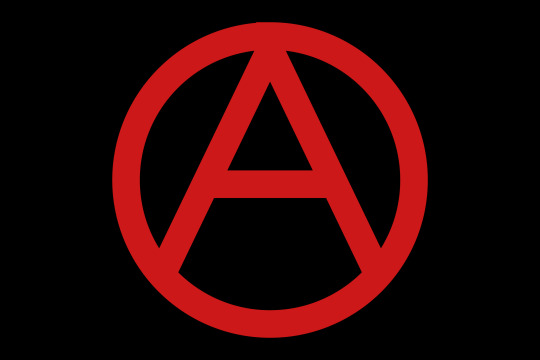
View On WordPress
0 notes
Text
A Breakdown of Timney Triggers
Some factory triggers are, shall we say, better than others. And some are downright mushy and a dreadful nightmare to use.

If you’re looking for a trigger upgrade, there’s likely a Timney Trigger for your platform - and you could do a lot worse than Timney.
Here’s why they’re some of the world’s finest triggers, made with durable components and cutting-edge technology.
A Variety of Factory Replacement Triggers
First things first, Timney makes a wide variety of drop-in ready triggers for a wide range of very popular gun platforms, including but not limited to:
● Ruger American Rifles
● Ruger Precision rifles
● Browning X-Bolt
● CZ 457 Rimfire
● Ruger American Rimfire
● Ruger 10/22
● Remington 700
● CZ Scorpion
● Glock pistols
● AR-15 rifles
● AR-10 rifles
● Mossberg rifles
● Mauser rifles
● Mosin-Nagant rifles
● Smith & Wesson firearms
● HK platforms, including the MP5
● And many others
In short, Timney is the preeminent producer of trigger upgrades for a wide range of platforms. If you’re looking for a new trigger, there’s a good chance Timney makes one compatible with your gun.
True Drop-in Compatibility, No Stock in-Letting Required
Many Timney Triggers are true drop-in ready triggers, with no stock in-letting required, and no need to visit a gunsmith. Remove the pins, install the Timney, and reinstall the pins.
Durable Components
Another reason to love Timney Triggers is that they are made with durable components, including aluminum housings, heat treated steel internals, and Teflon-nickel sears which are corrosion-resistant and offer excellent permanent dry lubricity.
Precision Adjustability
Timney offers a variety of different triggers, including two-stage triggers which are precision adjustable and extremely consistent. Whether you want to calibrate a hair trigger or prefer a somewhat heavy pull, a Timney can be customized according to your preferences.
Timney Trigger FAQs
● Can I install a Timney Trigger in an AR with a sear block?
You can install a Timney Trigger in an AR with a sear block but the sear block will need to be removed first.
● Do they work with polymer AR lowers?
Timney Triggers are compatible with polymer AR lowers but Timney uses a special plate that should be installed between the lower and the trigger group.
● How do I clean a Timney Trigger?
Oil-based cleaners are not recommended for Timney Triggers as they can attract particulate matter and leave a residue when dry. Instead, Timney recommends the use of compressed air to dislodge particulate matter, and an alcohol-based cleaner which will dissolve fouling, evaporate quickly, and leave no residue.
● Should I lube or oil a Timney Trigger?
Timney Triggers exhibit excellent permanent dry lubricity so they should not be oiled or lubed, though they should be kept clean.
Where Can You Get Timney Triggers Online?
Still interested in getting a new Timney Trigger for your rifle or pistol?
Check out what’s available online at Anarchy Outdoors via the previous link. They carry a wide range of Timney Triggers for many popular models, as well as TriggerTech Triggers and a wide range of gun parts upgrades.
If you have any questions about what they sell or how to make upgrades or repairs, get in touch with their customer service directly at 833-980-0333.
0 notes
Text
Minecraft Hacked Clients
Minecraft Hacked Clients
r/minecraftclients
FAQ ( read before posting ) + Partnering with alts.top
PolyMC big rat dot monster
Anticheats are a shit!
Minecraft Servers
i made an autoclicker in 10 minutes and ive been using it on lunar for so long without a ban
Where can I buy a ranked Hypixel accounts at a bargain price with PayPal?
Add layers. Colorize. Remove objects. Change background. Photoshop makes it easy to switch backgrounds.
AutoMLG + Radiar
(Hypixel Skyblock) any mod I could use to ESP the block?
for finding special CH structures like spirals/thrones
Filter by flair
Announcement
EMERGENCY ALERTS
Java - Ghost Cheating
Alts
Media
Java - Minigames/Hypixel Cheating
Java - General Cheating
Poll
Bedrock
Java - Anarchy Clients
r/minecraftclients Rules
THE WIKI. READ THIS!
The wiki was created by our community and contains plenty of great advice from selecting the right client for beginners, all the way up to creating a custom code.
We highly recommend that members to check out our wiki.
Wiki was created on 13/03/2021 in response to a suggestion to u/heyitsmeagainduh.
Head over to faq.minecraftclients.info for common questions. Site is maintained by u/fangeleone2526
1 note
·
View note
Text
Minecraft Clients that are Hacked
Minecraft Hacked Clients
r/minecraftclients
FAQ (Read before posting) + Partnering with Alts.top
PolyMC big rat dot monster
Anticheats are shit!
safe minecraft mods
i made an autoclicker in 10 minutes and ive been using it on lunar for so long without a ban
Where can I buy ranked Hypixel accounts for a low price using PayPal?
Layer. Colorize. Remove objects. Change background. With Photoshop, everyone can.
AutoMLG + Radar
(Hypixel Skyblock). Any mod I can use for ESP specific blocks?
for finding special CH structures like spirals/thrones
Filter by flair
Announcement
EMERGENCY Announcement
Java - Ghost Cheating
Alts
Media
Java - Minigames/Hypixel Cheating
Java - General Cheating
Poll
Bedrock
Java - Anarchy Clients
r/minecraftclients Rules
THE WIKI. READ THIS!
Our community has created our wiki and it has plenty of excellent advice, starting with choosing the right client for beginners to create a code.
We suggest that members check out our Wiki.
Wiki created on 13/03/2021 due to a suggestion to u/heyitsmeagainduh.
Head over to faq.minecraftclients.info for common questions. The site is maintained by u/fangeleone2526.
1 note
·
View note